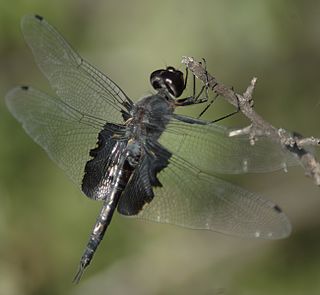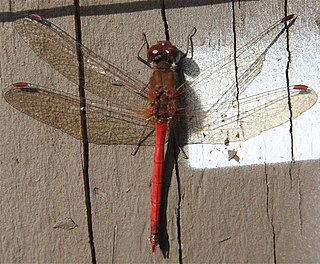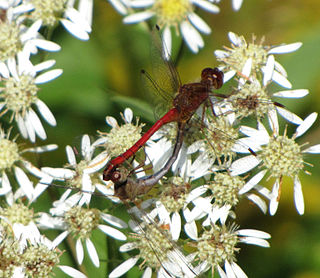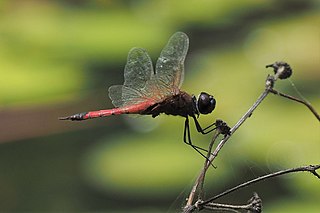
Aeshna isoceles is a small hawker dragonfly that is found in Europe, mostly around the Mediterranean, and the lowlands of North Africa. Its common name in English is green-eyed hawker. In Britain it is a rare and local species and is known as the Norfolk hawker. It has a brown colour with green eyes and clear wings and also a yellow triangular mark on the second abdominal segment which gave rise to its scientific name. It used to be in the genus Anaciaeschna as it has several differences from the other members of the genus Aeshna. Its specific name is often spelt isosceles.

The chasers, darters, skimmers and perchers and their relatives form the Libellulidae, the largest family of dragonflies. It is sometimes considered to contain the Corduliidae as the subfamily Corduliinae and the Macromiidae as the subfamily Macromiinae. Even if these are excluded, there remains a family of over 1000 species. With nearly worldwide distribution, these are almost certainly the most often seen of all dragonflies.

The red-veined darter or nomad is a dragonfly of the genus Sympetrum.

The green darner or common green darner, after its resemblance to a darning needle, is a species of dragonfly in the family Aeshnidae. One of the most common and abundant species throughout North America, it also ranges south to Panama. It is well known for its great migration distance from the northern United States south into Texas and Mexico. It also occurs in the Caribbean, Tahiti, and Asia from Japan to mainland China. It is the official insect for the state of Washington in the United States.

The Cordulegastridae are a family of Odonata (dragonflies) from the suborder Anisoptera. They are commonly known as spiketails. Some vernacular names for the species of this family are biddie and flying adder. They have large, brown or black bodies with yellow markings, and narrow unpatterned wings. Their bright eyes touch at a single point, and they can be found along small, clear, woodland streams, flying slowly 30 to 70 cm above the water. When disturbed, however, they can fly very rapidly. They usually hunt high in forest vegetation, and prefer to capture prey resting on leaves or branches.

The black saddlebags is a species of skimmer dragonfly found throughout North America. It has distinctive wings with characteristic black blotches at their proximal ends, which make the dragonfly look as though it is wearing saddlebags.

Tramea basilaris, also known as the keyhole glider, red marsh trotter, or wheeling glider, is a species of dragonfly in the family Libellulidae. It is found throughout most of Africa, Arabia and in Asia. Capable of very long migration and nomadic flight, it reached Europe once, being recorded at the island of Linosa, Sicily (Italy) in 2016. Similarly, this species is able to use the trade winds to reach the Caribbean and South Americas, where it was caught in Suriname, "Guadeloupe" and "martinique".

Tramea is a genus of dragonflies in the family Libellulidae, the skimmers and perchers. Species of Tramea are found in tropical and subtropical regions around the globe. They typically have colored bases to their otherwise translucent hindwings. In particular when they fly, this creates the impression of their carrying bags at the start of their abdomens. They are known commonly as saddlebags or saddlebags gliders.

Tramea limbata is a species of dragonfly in the family Libellulidae. Its common names include black marsh trotter, ferruginous glider and voyaging glider.

Sympetrum vicinum, the Yellow-Legged Meadowhawk is one of some fifteen North American species of autumn meadowhawk, which are members of the Odonate family Libellulidae. It grows to 26–35 mm long.

The white-faced meadowhawk is a dragonfly of the genus Sympetrum. It is found in the northern United States and southern Canada. Adult males are identifiable by a distinctive pure white face and red bodies. However, females are usually yellowish or brown.

Sympetrum rubicundulum, commonly known as the ruby meadowhawk, is a species of dragonfly of the family Libellulidae. It is found in northern United States and southern Ontario, Canada. Adult males are identifiable by a distinctive orange to brown face and red bodies. Females faces have same colours as males; bodies are brown to dark-red.

Tramea carolina, the Carolina saddlebags, is a species of dragonfly native to eastern North America.

Tramea transmarina, known as the red glider or northern glider, is a species of dragonfly in the Libellulidae family. The type locality for Tramea transmarina is Fiji, but subspecies are found in the islands of the Pacific, north-eastern Australia and Southeast Asia.

Tramea loewii, the common glider, is a species of dragonfly in the Libellulidae family.

Tramea stenoloba, the narrow-lobed glider, is a species of dragonfly in the Libellulidae family. It is found in the Cocos Islands, Lesser Sunda Islands, Java Sea and Australia.

Tramea insularis, the Antillean saddlebags, is a species of skimmer in the family Libellulidae. It is found in the Caribbean, Central America, and North America.

Tramea calverti, the striped saddlebags, is a species of skimmer in the dragonfly family Libellulidae. It is found in the Caribbean Sea, Central America, North America, and South America.

Tramea abdominalis, the vermilion saddlebags, is a species of skimmer in the dragonfly family Libellulidae. It is found in the Caribbean Sea, Central America, North America, Oceania, and South America.




















